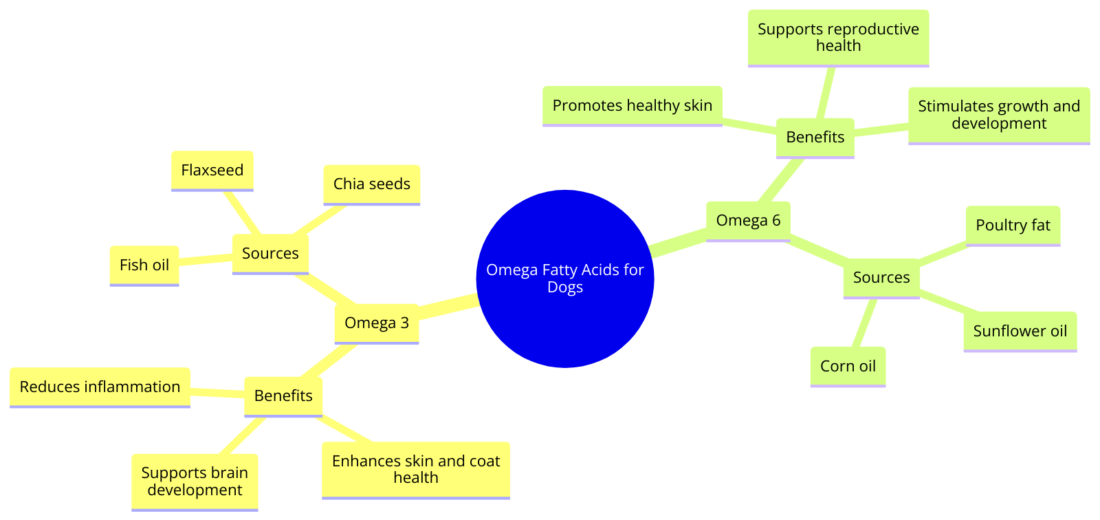

Finding the right balance of nutrients for your dog’s diet can significantly impact their overall health. Omega 3 and 6 supplements offer a powerful combination of fatty acids essential for various bodily functions. This guide aims to provide a thorough understanding of these supplements, their benefits, and how to choose the best ones for your furry friend.
Understanding Omega-3 and Omega-6 Supplements for Your Dog
Ensuring your dog’s diet includes the correct balance of omega 3 fatty acids and omega 6 fatty can help prevent itchy skin and promote a healthy coat. These nutrients should be sourced carefully, with ingredients like fish oil or flaxseed indicating a quality product.
The Importance of Omega-3 and Omega-6 in Canine Health
Omega-6 and omega-3 fatty acids play crucial roles in canine health, from supporting cell membranes to aiding in kidney disease and skin disease management. Their benefits extend to preventing arthritis and promoting overall well-being in dogs.
Balancing Omega-6 and Omega-3 Fatty Acids
For optimal health, the ideal ratio of omega-6 to omega-3 in a dog’s diet is crucial. This balance supports various bodily functions and promotes a healthy immune system, ensuring your pet remains active and happy.
How Omega-3 and Omega-6 Benefit Dogs
Omega fatty acids, particularly omega-3s, are vital for maintaining healthy cell membranes, supporting joint function, and preventing skin disease. They serve as a source of omega-3 fatty acids, contributing significantly to a dog’s overall health.
Effects of Too Much Omega-3 Fatty Acids
While essential fatty acids are crucial for health, an excess of omega-3 can disrupt the balance, leading to adverse effects. Moderation is key when supplementing your dog’s diet with these nutrients.
Effects of Too Little Omega-3 Fatty Acids
A deficiency in omega-3 fatty acids can lead to skin problems and negatively affect the nervous system. Ensuring a balanced intake of omega-6 and omega-3 fatty acids is essential for maintaining your dog’s health.
Identifying Quality Sources of Omega-3 and Omega-6
Quality sources of omega-6 and omega-3 fatty acids are essential for supplementing your dog’s diet effectively. Identifying these sources can ensure your dog benefits from these critical nutrients.
Organic Flaxseed Oil
Organic flaxseed oil is a premium dietary supplement that supports the nervous system and offers a plant-based source of omega-3 fatty acids, making it an excellent addition to a dog’s diet.
Distilled Wild Fish Oil
Distilled wild fish oil is rich in essential fatty acids, including EPA and DHA, which promote heart health, a healthy coat, and are particularly beneficial for growing puppies.
For a blog post about Omega 3 and Omega 6 supplements for dogs, including tables can provide clear, concise information that’s easy for readers to digest. Here are some tables that would be helpful:
Table 1: Benefits of Omega 3 and Omega 6 Fatty Acids for Dogs
| Fatty Acid | Benefits for Dogs |
|---|---|
| Omega 3 | – Supports brain development – Enhances skin and coat health – Reduces inflammation – Supports heart health – May improve joint health |
| Omega 6 | – Promotes healthy skin – Supports reproductive health – Stimulates growth and development – Essential for cell membrane integrity – Helps with the immune function |
Table 2: Recommended Sources of Omega 3 and Omega 6
| Fatty Acid | Natural Sources |
|---|---|
| Omega 3 | – Fish oil (salmon, sardines) – Flaxseed oil – Chia seeds – Walnuts – Hemp oil |
| Omega 6 | – Poultry fat – Sunflower oil – Corn oil – Safflower oil – Borage oil |
Table 3: Recommended Dosage of Omega Fatty Acids for Dogs
| Dog’s Weight (lbs) | Omega 3 (mg/day) | Omega 6 (mg/day) |
|---|---|---|
| < 10 | 100 – 250 | 50 – 100 |
| 10 – 30 | 250 – 500 | 100 – 200 |
| 30 – 60 | 500 – 1,000 | 200 – 400 |
| > 60 | 1,000 – 1,500 | 400 – 600 |
Note: Always consult with a veterinarian before starting your dog on supplements.
Table 4: Signs of Omega Fatty Acid Deficiency in Dogs
| Deficiency Signs | Possible Cause |
|---|---|
| Dry, itchy skin | Low Omega 6 |
| Dull coat | Low Omega 3 & 6 |
| Inflammation | Low Omega 3 |
| Poor wound healing | Low Omega 6 |
Table 5: Signs of Excessive Omega Supplementation
| Excessive Signs | Possible Cause |
|---|---|
| Weight gain | High Omega 3 & 6 |
| Diarrhea | High Omega 3 |
| Blood thinning | High Omega 3 |
It’s crucial to balance the intake of Omega 3 and Omega 6 fatty acids to avoid potential health issues. Always follow the recommended dosage and consult with a veterinarian for personalized advice.
Choosing the Right Supplement

Selecting the appropriate omega supplement for your dog involves understanding the benefits of various sources and formulations. This ensures your pet receives the nutrients needed for a healthy life.
Fish Oil for Dogs
Fish oil is a rich source of polyunsaturated fatty acids and is critical for omega-3 supplementation in dogs, promoting overall health and vitality.
Focus on EPA and DHA
When choosing omega-3 supplements, focusing on products with high levels of EPA and DHA can offer significant health benefits for your pet.
Krill Oil for Dogs: A Potent Alternative
Krill oil provides a potent alternative to traditional fish oils, with a combination of flaxseed oil, safflower oil, and omega 3-6-9, supporting skin health, healthy coat, and managing seasonal allergies.
The Role of Borage Seed Oil and Vitamin E
Borage seed oil, with its high levels of GLA, supports cell membrane fluidity and skin elasticity, while vitamin E enhances its benefits, promoting a healthy heart and immune system in dogs.
When and How to Supplement

Deciding when and how to supplement your dog’s diet with omega-3 and omega-6 is crucial for their overall health. It’s essential to understand the signs indicating your dog may benefit from these supplements and to know the best practices for administering them. Always consider the specific needs of your dog, as well as any potential side effects, before starting any new supplement regimen. Consulting with a veterinarian can provide tailored advice to ensure the supplements support your dog’s health without causing adverse reactions.
Signs Your Dog Might Need an Omega Supplement
Omega-3 supplements are known for their ability to reduce inflammation, which is at the root of many diseases, such as arthritis and heart disease. If your dog is overweight, they are at a higher risk for low-grade chronic inflammation. Omega supplements not only serve as a preventative measure but can also alleviate discomfort when inflammatory symptoms begin to appear. It’s crucial to balance omega-3s with omega-6s in your dog’s diet to ensure optimal health. Observing your dog for signs of stiffness or discomfort can help you decide when to consider omega supplementation.
Omega-3 and Omega-6 in the Diet
Incorporating omega-6 and omega-3 fatty acids into your dog’s food can offer significant health benefits. These fatty acids play a crucial role in supporting their overall well-being, including maintaining a shiny coat, healthy skin, and proper cell function. When selecting dog food, look for products that contain a balanced ratio of these essential fatty acids to promote your dog’s optimal health. Natural sources like fish or flaxseed oil can be excellent additions to ensure your dog receives the necessary nutrients.
Administering Supplements: Dos and Don’ts
When giving omega supplements to your dog, there are several important dos and don’ts to keep in mind. Always follow the recommended dosage provided by the supplement manufacturer or your vet to avoid any adverse effects. Introduce the supplement gradually into your dog’s diet to monitor for any signs of digestive upset. It’s also crucial to choose high-quality supplements from reputable sources to ensure they are safe and effective for your dog. Remember, consistency is key to seeing the benefits of omega supplementation.
Avoid Cod Liver Oil
When selecting omega supplements for your dog, it’s important to avoid cod liver oil. Although rich in omega-3 fatty acids, cod liver oil also contains high levels of vitamins A and D, which can be toxic to dogs in large amounts. Instead, opt for supplements specifically designed for dogs, focusing on those that provide EPA and DHA, the most beneficial types of omega-3 for canine health. Giving your dog the right type of supplement will support their health without the risk of vitamin toxicity.
Potential Side Effects and Precautions
While omega supplements can offer numerous health benefits for dogs, it’s essential to be aware of potential side effects and take necessary precautions. Some dogs may not tolerate fish oil well, leading to digestive issues like diarrhea. High doses of omega supplements, especially in dogs prone to gastrointestinal upset, should be avoided. Always start with a lower dose and gradually increase to the recommended level while monitoring your dog for any signs of discomfort. If adverse reactions occur, consult with your veterinarian for guidance on adjusting the supplement regimen or exploring alternative sources of omegas.
Pancreatitis and Fish Oil Supplements
For dogs with a history of pancreatitis, caution is advised when considering fish oil supplements due to their high-fat content. Although there are no direct reports of omega-3 fatty acid supplements causing pancreatitis in dogs, high-fat foods can exacerbate the condition. Consulting with your veterinarian is crucial to determine the appropriateness of fish oil supplements for your dog and to establish a safe dosing schedule. Monitoring your dog closely for any signs of pancreatic flare-ups while on these supplements is essential for their well-being.
Carprofen and Fish Oil Supplements: A Cautionary Tale
If your dog is on carprofen for pain and inflammation, adding omega-3 supplements to their diet requires careful consideration. Omega-3 fatty acids can increase the risk of bleeding, a potential side effect when combined with medications like carprofen. It’s important to discuss with your veterinarian the best approach to supplementing your dog’s diet with omega-3s to ensure it supports their brain health and overall well-being without compromising their safety. Soft chews formulated with omega-3 may be a safer alternative, but professional advice is always recommended.
Monitoring Your Dog for Adverse Reactions
Regularly monitoring your dog’s diet and reaction to new supplements is key to ensuring their health and safety. Look for signs of digestive upset, such as diarrhea or vomiting, which could indicate intolerance to omega supplements. Including sources of omega-6 fatty acids, like corn oil, in your dog’s diet can also impact their well-being, so it’s important to maintain a balanced ratio of omega-3 and omega-6 fatty acids. Always consult with your veterinarian if you notice any adverse reactions to supplements, as adjustments to the regimen may be necessary.
Beyond Supplements: Diet Adjustments
Maintaining your dog’s health goes beyond merely supplementing with omega-3 and omega-6. Diet adjustments can play a crucial role in providing natural sources of these essential fatty acids. Incorporating foods rich in omega-3 and omega-6, like certain fish, nuts, and seeds, can enhance the nutritional value of your dog’s meals. These adjustments can support their overall health, promoting a stronger immune system, healthier skin, and a shinier coat. Always aim for a balanced diet to ensure your dog receives all the necessary nutrients for optimal well-being.
Incorporating Natural Sources of Omega-3 and Omega-6
Incorporating natural sources of omega-6 and omega-3 fatty acids into your dog’s diet can significantly benefit their health. These fatty acids are essential for various bodily functions, including energy production, vitamin transport, and cell membrane support. Foods rich in omega-3, such as flaxseeds, and omega-6, like sunflower oil, can help manage conditions like skin diseases, arthritis, and heart issues. Always consult with a veterinarian to ensure the dietary sources and amounts are appropriate for your dog’s specific health needs.
Dogs and Cats: Special Considerations
When it comes to omega supplements, dogs and cats have different dietary needs, especially concerning skin health. While both can benefit from omega-3 and omega-6 fatty acids, the balance and sources might vary. For example, fish oil is a common omega-3 supplement for dogs, but cats may require different forms or amounts. Understanding the specific needs of your pet is crucial in selecting the right type of supplement and dosage to support their health, including maintaining a healthy skin and coat.
Expert Insights and Community Feedback
Gathering insights from veterinary professionals and feedback from the pet community can be invaluable when considering omega supplements for your dog. These perspectives offer a wealth of knowledge and experience, highlighting the benefits and potential challenges of supplementing your dog’s diet with omega fatty acids. Whether it’s through vet-recommended practices or real-life success stories, understanding the impact of omega supplements on canine health can guide you in making informed decisions for your pet’s well-being.
Vet-Recommended Practices for Supplementing Omega Fatty Acids
Veterinarians often recommend incorporating sources of omega fatty acids, like sunflower oil, into your dog’s diet to support their health. These recommendations are based on the latest research and clinical experience, aiming to optimize the benefits of omega supplements while minimizing risks. Following vet-advised dosing schedules, selecting high-quality supplements, and monitoring your dog for any reactions are key practices for safely supplementing omega fatty acids. Always consult with your veterinarian for personalized advice tailored to your dog’s specific health needs.
Omega Supplements for Dogs with Specific Needs
Omega supplements offer a range of benefits tailored to dogs with specific health conditions. Understanding the unique needs of your pet can guide you to the most beneficial supplement choice.
Support for Dogs with Joint Issues
Omega-6 and omega-3 fatty acids play significant roles in maintaining healthy joints in dogs. These fatty acids are not just energy sources; they are crucial in managing inflammation and aiding in the repair of cell membranes. This makes them incredibly beneficial for dogs suffering from orthopedic diseases like arthritis. Including these supplements in a dog’s diet can help manage pain and improve mobility, offering a better quality of life for pets with joint issues.
Omega Supplements for Enhanced Skin and Coat Health
For dogs suffering from dull coats or skin irritations, omega supplements can offer a solution. Rich in omega-3 fatty acids, these supplements support skin health by reducing inflammation and promoting a shiny, healthy coat. The health benefits extend beyond the surface, contributing to overall joint health and cognitive function. Pet owners notice a significant improvement in their dogs’ appearance and wellbeing when incorporating these supplements into their diet.
The Final Verdict on Omega 3 and 6 Supplements for Dogs
Making an informed decision about omega 3 and 6 supplements for your dog involves understanding their health benefits and potential side effects. These supplements can significantly improve skin, coat, and joint health, contributing to overall body health. However, it’s vital to choose high-quality sources and consult with a vet to tailor the supplement to your dog’s specific needs.
Making Informed Decisions for Your Dog’s Health
Omega-6 fatty acids are essential for various bodily functions in dogs, including immune function and skin health. By including the right balance of omega-3 and omega-6 in your dog’s diet, you can support their overall wellbeing. An informed decision involves understanding the role of these fatty acids and selecting supplements that meet your dog’s specific health requirements.
The Ongoing Journey of Care and Wellness
Caring for your dog is an ongoing journey that involves regular health checks, a balanced diet, and the right supplements. Omega fatty acids play a crucial role in maintaining healthy organ function and should be adjusted according to your dog’s changing needs. By staying informed and working closely with your vet, you can ensure your dog enjoys a happy, healthy life.
- About the Author
- Latest Posts

Sara is a passionate writer and an avid lover of Havanese dogs. With several years of experience in dog training, breeding, and care, she has developed a deep understanding and admiration for the Havanese breed. Sara’s mission is to provide valuable insights, resources, and tips to help Havanese dog owners provide the best possible care and nurturing for their beloved pets.




